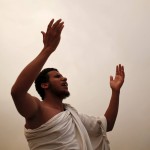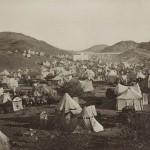Within the hajj-rituals hides an ode to Hajar, the black woman (freed) slave from Egypt (may God be pleased with her). Beyond the focus on practical do’s and don’ts we find inspiration for the struggle against racism, sexism and poverty.
A blessing in disguise
Sarah and Hajar, the two wives of Abraham, didn’t get along anymore. Therefore Abraham brought Hajar and their son Ishmael to the dry valley of Bakkah and left them there. It seemed like Sarah, who was of wealthy lineage, was privileged over Hajar. The Judeo-Christian tradition teaches that God’s covenant with Abraham’s descendants would only apply to his offspring with Sarah. And not for his children with Hajar.
Beyond the dry valley
Islam and history teach us differently. Not only did the dry valley flourish into a prosperous city with Hajar’s presence. Moreover, it developed into the oldest, largest, and world’s most visited Sacred Site. And as God blessed Sarah’s offspring by generations of prophets for the Jewish people. So did God with the descendants of Hajar, blessing her with the Seal of the Prophets: Muhammad ibn Abdillah (may God’s peace and blessings be upon him). He restored the tradition of pilgrimage in honor for all of mankind.
In her footsteps
In Hajar’s footsteps every pilgrim walks between Safa and Marwa and drinks of the inexhaustible water source ZamZam. They do so in remembrance of how her desperation in the dry valley blossomed into a great place of wealth and spirituality with perseverance, faith and God’s blessing. God honors Hajar as a role model for every pilgrim, for everyone.
Racism, sexism and poverty
Of all walks of life, God honors a black woman who was a freed slave. A valuable lesson on the equality of every human being, regardless of sex, origin or wealth, with only God-consciousness as a relevant distinction. Every pilgrim walking in the footsteps of Hajar, is to wonder at every step: what is my contribution to the struggle against racism, sexism and poverty?
God’s tribute in honor
How do we implement those great lessons thought by the story of Hajar? Is the Muslim community an example when it comes to the struggle against oppression, racism and poverty? To what extent is Mecca a leading global example in the fight against those forms of exclusion? To what extent do we honor God’s ode to Hajar?
Jeroen Schilder (29, Rotterdam – The Netherlands) is sociologist, social worker and public administrator with a focus on religion and emancipation. During his hajj last year he promised himself to give back at least some of the lessons he learned there to the community. This is one of them for the hajj-special on IlmFeed.


